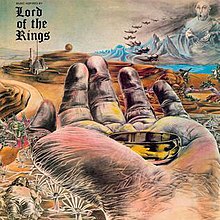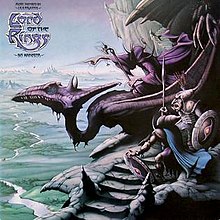Music Inspired by Lord of the Rings (Bo Hansson album)
| Music Inspired by Lord of the Rings | ||||
|---|---|---|---|---|
 |
||||
| Studio album by Bo Hansson | ||||
| Released | December 1970 | |||
| Recorded | Late 1969 – early 1970 | |||
| Studio | Bo Hansson's summer house on Älgö in the and Studio Decibel in | |||
| Genre | Progressive rock, space rock, psychedelic rock | |||
| Length | 38:13 | |||
| Label | Silence | |||
| Producer | Anders Lind, Bo Hansson | |||
| Bo Hansson chronology | ||||
|
||||
| Alternative cover | ||||

Cover of the original Sagan om ringen release
|
||||
| Alternative cover | ||||

Cover of the 1977 reissue
|
||||
| Professional ratings | |
|---|---|
| Review scores | |
| Source | Rating |
| AllMusic | |
| Q | |
Music Inspired by Lord of the Rings is an instrumental progressive rock album by Swedish musician Bo Hansson. As its title suggests, it is a concept album based on author J. R. R. Tolkien's high fantasy novel, The Lord of the Rings. The album was originally issued in Sweden in late 1970, under the Swedish title of Sagan om ringen, and was subsequently re-released internationally as Music Inspired by Lord of the Rings in September 1972. The album reached the Top 40 of the UK Album Chart and was eventually certified gold in the UK and Australia. It was also moderately successful in America, where it reached number 154 on the Billboard Top LPs & Tapes chart.Music Inspired by Lord of the Rings remains the only release by Hansson to have reached the UK and US charts and as a result, it is by far his best known and most successful album.
Prior to the recording of Music Inspired by Lord of the Rings, Bo Hansson had worked as one half of the duo Hansson & Karlsson. The duo were relatively well known in their native Sweden and between 1967 and 1969 they released a series of well received albums. By early 1969, however, Hansson's musical partner Janne Karlsson had embarked upon a successful career as a television presenter and comedian, resulting in the breakup of the duo. At around the same time, Hansson became fascinated with the works of J. R. R. Tolkien and in particular The Lord of the Rings, after being introduced to the book by a girlfriend. Hansson moved into a friend's apartment and began working on a musical interpretation of the book, producing a number of demo recordings of material that would eventually be included on the album.
Hansson then approached sound engineer and founder of Silence Records, Anders Lind, with the idea of recording an album based on the book. Lind was encouraged by the demos and agreed to release the album on Silence. However, the fledgling record company could not afford the expensive recording studio time needed to realise the production of the album and so, a small summer house on the remote island of Älgö, in the , was converted into a makeshift recording studio. Throughout late 1969, Hansson and Lind worked on the album at the summer house, with the help of a handful of session musicians and friends, before relocating to Studio Decibel in Stockholm to complete the album in early 1970. Hansson has stated that his original intention for the album was to include a string section and other exotic instruments, such as the harp, but the lack of finances available from Silence Records resulted in the majority of the album having to be recorded using primitive electronic keyboards and Moog synthesizers.
...
Wikipedia
